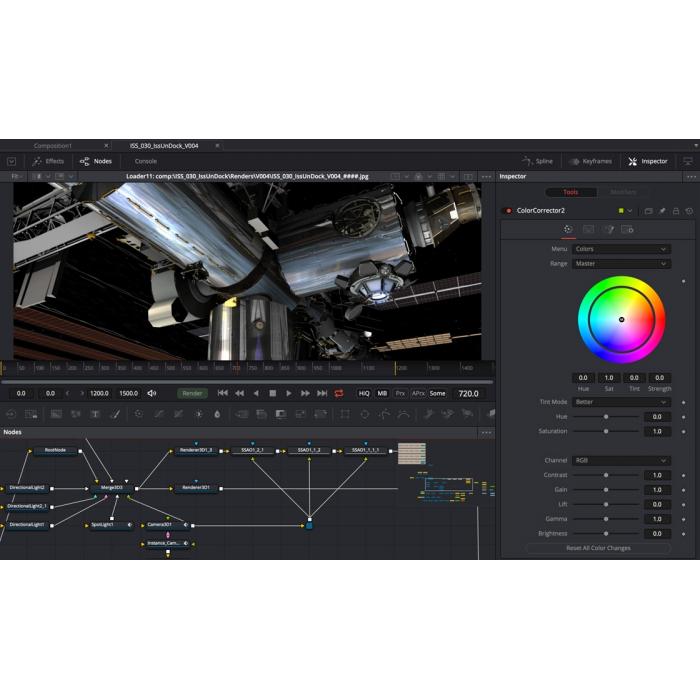
Blackmagic Design's leading flagship compositing tool, its vast tool set is like no other product. The continued focused development brings a creative postproduction system that sits at the forefront of the industry. Fusion Studio is resolution independent, supports 32 and 64-bit Windows platforms, stereoscopy, HDRI and 32-bit floating point imagery, Python scripting, GPU acceleration, 3D environment incl. shaders, 3D particles and FBX import, and much more! Discover, how Fusion helps studios worldwide create state of the art visual effects masterpieces like Avatar, Prometheus or Sin City as well as TV series like Lost, Battlestar Galactica and Alias. For Windows, Linux and Mac OS X.
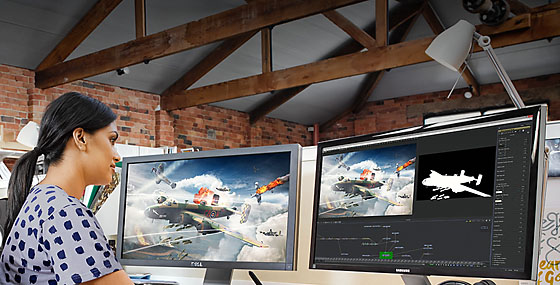
Fusion 8 Studio's 3D system and renderer import geometry from FBX and Alembic, as well as OBJ, 3DS, and Collada. Millions of polygons, complex Shaders, Ambient Occlusion, Deep Volumetric Atmospherics, Particles Systems, and other toolsets, are now all final rendered with advanced optimization for GPUs, benchmarking in seconds instead of hours. Fusion 8 Studio offers the ability to have multiple 3D renderers all in one project, all integrated and rendering different aspects from the same scene. Generating Deep Passes, such as World Position, Normals, UV, and Velocity, with Fusion's flexibility to combine 3D and 2D in a single workflow, is a significant demarcation point from other applications. In addition to new 3D tools (Replace Normals 3D, 3D Text Bevel Shaper, or 3D Interactive Splines), Fution 7 Studio contains Dimension, a highly regarded Optical Flow and Stereoscopic technology.
Productivity and Workflow
Productivity and workflow are streamlined further with automation tools and enhanced rendering. Fusion 8 Studio's built-in Render Manager, and the Scripting engine that supports Python 2.x and 3.x, and Lua, are supported with scripts that ship as part of Fusion 8 Studio. Developing Macro tools, managing and sharing tools, jobs, and footage, are now part of Fusion 8's design for studio-wide use via the integrated Bin System. Fusion 8 Studio can have multiple projects open at the same time, with cut and paste abilities between comps adding to the integrated environment design. It is now a matter of seconds to test one comp while rendering another. The Integrated Script Debug Console works for Python and Lua to step through code, set breakpoints, and have multiple scripts open at the same time. Just-In-Time Compiling for Fuses and OpenCL tools gives the ability to develop sophisticated tools without having a C++ development environment. Immediately compile and use these tools while working in the Fusion comp. These are multithreaded for speed, and OpenCL is GPU accelerated.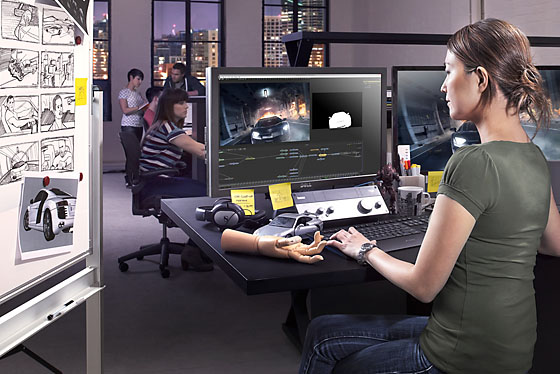
GPU acceleration
With Fusion’s OpenCL- and GPU-accelerated architecture, eyeon accesses real working environments to reach new levels of film making. eyeon’s Deep Compositing technology is the demarcation point of strategic development. For example, Fusion’s Stereoscopic, Volumetric Fog and Water, and World Position Pass tools have opened the door to advanced technical production.
Volumetric Lighting
The Volume Fog Tool features volumetric lighting. Adjusting 3D scenes within Fusion’s real-time deep volume system and integrating the volumes directly into images with the World Position Pass tool provide an unsurpassed methodology for controlling light samples, scattering, asymmetry, and density. These volumes can be generated inside Fusion or imported via EXR.
Color Science
Advances in color handling and new color tools make color matching, profiling, and working with diverse cameras and Digital Intermediate systems seamless. THX® advances support for Fusion in their latest release of Cinespace™. Fusion adds Academy Color Encoding Specification (ACES) linear color space to its color pipeline, as well as new automated color correction reversing and color grading capabilities. Also included are versatile 3D LUT creation, analysis, and design tools.
Lens Distortion
With the importing of data and a number of various lens models, the Lens Distort tool implements the 3D equalizer lens distortion model to invert or undistort an image. The data can then be imported into Fusion for the most accurate results.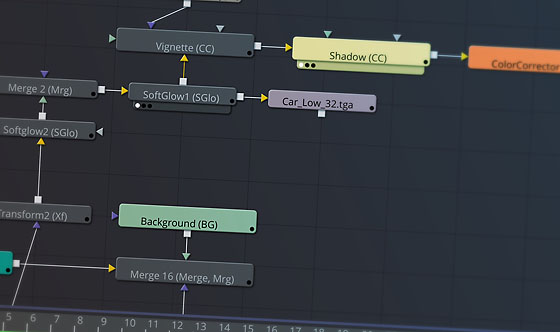
Camera Support
eyeon continues to extend the support of leading capturing technologies with the direct ARRI® raw format loading from Alexa® cameras, Vision Research Phantom® Cine raw loading, together with RED®, making a comprehensive color pipeline for Digital Cinema cameras. Only Fusion can analyze, display, playback, compare, and tune the color telemetry and transcode to many formats. With Scopes, 3DLuts, professional 3D monitor support, and added support for Panalog®, Sony® S-Log, ARRI LogC, Canon® Log, RED Log, Viper®, it is possible to mix many camera formats and achieve a consistent look. For comprehensive integration, ARRI color spaces have been added to Fusion’s Gamut tool.
Advanced 3D and Geometry Particles
Considered by advanced artists as possibly one of the most exciting developments in Fusion, Replicate 3D is a new tool that allows for Geometry Particles. To replicate 3D shapes at the vertex positions of any mesh offers unlimited potential. In addition, this extreme 3D tool sports the full set of Jitter and Transform options seen in Duplicate3D.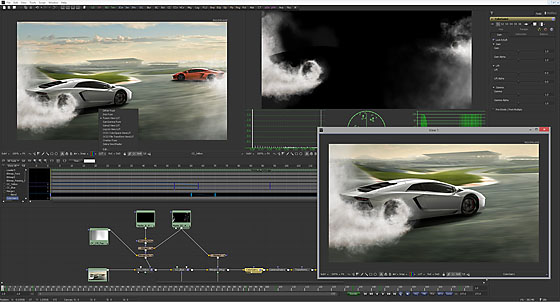
Generation
Fusion 8 Studio also contains Generation, a visual desktop for moving images, designed to make the studio workflow really flow. From the beginning, Generation was developed within studio environments to ensure that it meshed with real-world conditions. Generation combines a comprehensive shot-tracking system while working with EDLs and playlists. The system includes annotation and grease pencil drawing tools for live discussions of shots or sequences. Comments entered by one artist appear immediately on any connected machines, whether on the same LAN or at remote locations connected via VPN. Annotated frames are indicated in the timeline, and comments can be overlayed or hidden during playback. A complete record of all decisions and client requests is saved with each project.
Working closely with VFX clients, Generation has been refined and tested for the ultimate studio workflow. Managing post production jobs and team members is an integral part of a studio. Collaborating with a client and effectively delivering finished content is paramount. Generation is designed to streamline the studio process. Interactive tooling that can perform far beyond a web browser can shake hands with all systems running in the studio as well as the artists. Precise project and team communication make production faster and more accurate. The playback engine allows for High Frame rate Stereo Playback, such as 48 fps, 60fps, and 120FPS. Together with the stereo-display modes this is perfect for stereo productions.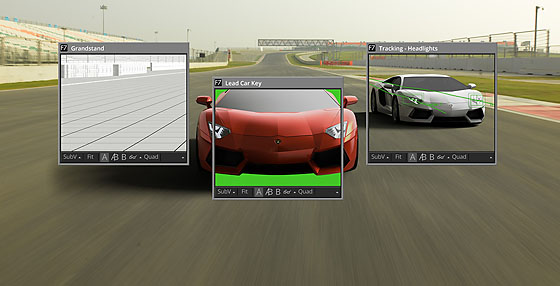
An outstanding tool for project and company-wide playback, review, and collaboration between artists, supervisors, and producers, Generation sports an integrated chat-client environment and grease paint annotations to provide fast communication for everyone working on a shot. Versioning of comps ensures that you can always step back to an earlier stage of your work or compare shots with each other. Studios, artists, and supervisors need a clear and concise view of VFX projects, and the status of their elements and shots. As a visual canvas and collaborative platform for managing postproduction pipelines, Generation AM sets the pace to rapidly view and render dailies and categorize shots, to communicate, to collaborate, to log information, to organize deliverables, and to manage processes.
Project Assign and Status provide an overview on the status of shots, what stage of production they are in, what needs to be reviewed and what has been green lit. Assigning workload to artists, reviewing version history, collaborating ideas are all in an accessible interface. Filtering of project status, artists and submissions give an overview and playback list to focus on key production shots. Generation is a fast and versatile tool for every production pipeline from one man shops to huge film pipelines.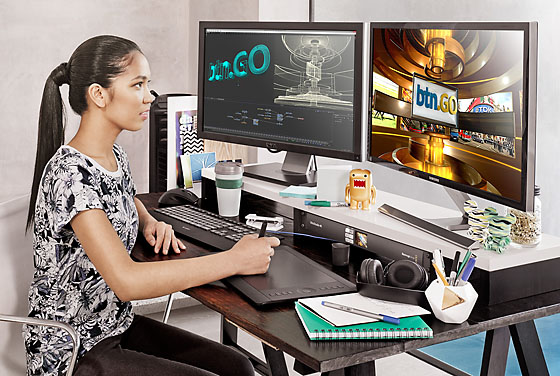
- 1. Evaluate your options.
- 2a. If you want to buy only one product with Aizdevums.lv leasing, then fill out the application here
- 2b. If you want to buy several items or use another leasing company, then put the items in the basket and choose the leasing service when ordering.
We offer leasing from Aizdevums SIA, Incredit SIA, ESTO.
Manager will check the availability of the items in the cart and send the loan application link. - 3. If you receive a positive response, contact us to purchase the product. Consultants will check the availability of the product.
- 4. If the product is available in the store or to be ordered from the warehouse, and you have received an affirmative answer from our consultants, please visit the store to proceed with purchase and leasing documents.
- 4a. You can also ask us to issue an invoice for this product and visit one of the leasing company branches to sign up leasing documents *..
- 5. Once the leasing documents have been signed up, you can receive the product in the store, if it is on site or inform our consultants and they will order it for you from the warehouse.
- *It is possible to arrange delivery for leased goods, so you can also perform the entire purchase process remotely.
**The sequence of leasing steps is the same for leases offered by InCredit Group.
***In case of doubt, contact our consultants!
When using leasing services, carefully evaluate your options to repay the loan!Lease
 Google
Google





